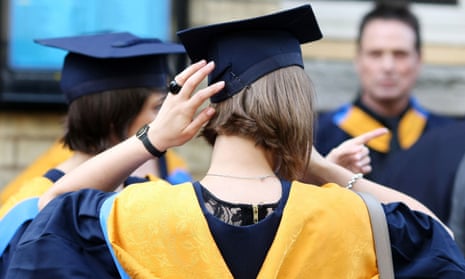A small group of institutions are causing the sudden explosion in the number of unconditional offers being made to sixth formers applying to UK universities, figures have shown.
Data released by Ucas, the higher education admissions service, reveals that most universities only make offers conditional on school-leavers achieving certain grades, and that the bulk of the increase in unconditional offers has come from about 20 institutions.
The statistics show that several universities rely heavily on unconditional offers – which offer a place before students sit their final exams – in the increasingly cut-throat competition for undergraduates. Three, the University of Suffolk, York St John University and the University of Bolton, made more than 70% of their offers unconditional in 2018.
Last year Nottingham Trent University alone made some form of unconditional offer to 8,660 applicants, while Lincoln University made more than 6,000 and Sheffield Hallam made 5,800.
Some one in three sixth-formers in England, Wales and Northern Ireland now receive at least one unconditional offer, for a total of 117,000 offers with an unconditional element last year, compared with just 3,000 five years earlier.
The Office for Students (OfS), the higher education regulator in England, has signalled its displeasure with the growth of so-called “conditional unconditional offers”, where a university offers a place unconditionally only if applicants make it their first choice.
Nicola Dandridge, the OfS’s chief executive, said: “There are some good reasons why universities might make unconditional offers. However, for a number of universities this data will make uncomfortable reading – where they cannot justify the offers they make they should reconsider their approach.”
A spokesperson for the Universities UK group, which lobbies on behalf of British universities, said: “We will explore with Ucas if there is more we can do as a sector to ensure they are used appropriately and proportionately so that the admissions system continues to work in the best interests of students.”
Out of the 140 largest universities, 85 make no or very few unconditional offers for first degree applicants. But 18 make at least 20% of their offers unconditional on results, including eight that make more than 50% unconditional, such as Roehampton University and the University of Northampton.
But some of the biggest numbers of unconditional offers come from some prestigious institutions, including the University of Birmingham, a member of the Russell Group of research-intensive universities.
In 2018 Birmingham made 4,765 offers with an unconditional component – out of 25,000 offers in total – although that was a decline on the 5,800 unconditional offers it made in 2017. In contrast, in 2013 Birmingham made just 330 unconditional offers.
The Ucas data revealed that the University of Nottingham – another Russell Group member – was also an enthusiastic user of unconditional offers, making nearly 3,000 last year, accounting for 11% of its total offers and close to twice the number it made just three years earlier.
Nottingham announced on Wednesday that it would no longer be using unconditional offers after this September, saying the increase in their use meant they were no longer attracting the applicants it wanted to encourage.
“Selective universities like Nottingham will always compete legitimately for talented applicants. However, we want everyone to be fully confident that they are admitted purely on their merits and potential. That is why we are ending the use of unconditional offers,” said Paul Greatrix, the university’s registrar.
Angela Rayner, the shadow education secretary, said unconditional offers were evidence that the government’s free market system of higher education was failing students.
“The current system gives universities perverse incentives that too often make it impossible for disadvantaged students to reach their potential,” Rayner said.
The growth in unconditional offers has taken place since the government lifted the cap on undergraduate places for individual institutions in 2015.
“The easiest and best way to tackle the increase in the use of unconditional offers is to move to a system where students apply to university after they receive their results,” said Matt Waddup, head of policy for the University and College Union, which has called for an overhaul of the admissions system.
Students in Scotland were excluded from the Ucas analysis, because many students there have received SQA Higher results at the time of their application.
Ucas also released the results of an investigation into its use of fraud prevention software during admissions, which was found to disproportionately flag black applicants as suspect. Ucas said the fault had been caused by “historical” data, and that it was working to improve its procedures.
